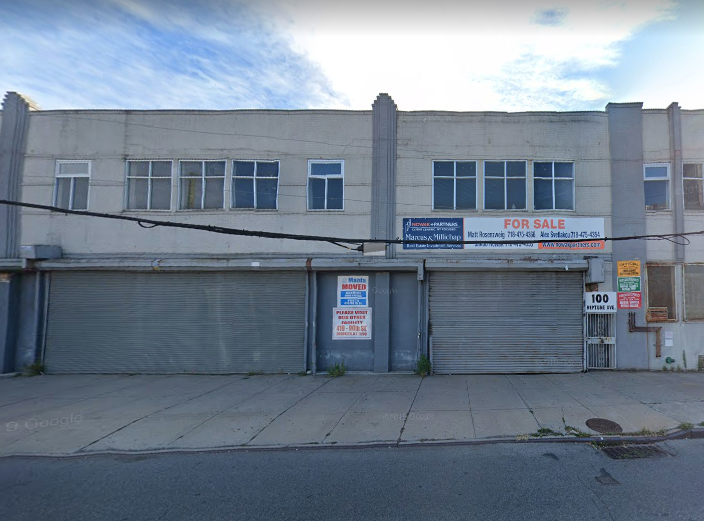Controversial Neptune Ave Shelter Site To Get Both New Owner And New Provider


A well-known service provider slated to oversee a controversial planned homeless shelter in Brighton Beach has been abruptly dropped by the site’s incoming owner, raising questions about the shelter’s future.
CORE Services, an organization that manages several shelter sites throughout the city, had been expected to operate a 170-bed shelter for single men at 100 Neptune Avenue, one of the 90 community-based shelters the city is seeking to build by the end of the year to combat homelessness.
The plan has raised the ire of many community members and local elected officials, who have gone as far as protesting outside the official residence of Mayor Bill de Blasio in opposition to the project.
But a real estate entity in contract to purchase the site, Bowery Holdings, has decided to drop CORE in favor of another service provider, according to the city’s Department of Homeless Services (DHS). The property is currently owned by an entity called Sor-San Realty Corp, who was not involved with the shelter proposal, sources said.
“Property owners have the discretion to decide which provider they’d like to partner with at a given location, and in this case they’ve opted to work with a different provider,” the department said in a statement provided to Bklyner.
“We’re confident that when this location opens our clients will be warmly welcomed to what will be a high-quality, borough-based facility,” the statement continued. “And through collaborative support and compassion, we will make this the best experience it can be for all.”
Reached by phone, Max Stern, a principal at Bowery Holdings, declined to comment before hanging up. A source close to the project believes the new operator may be the nonprofit Bowery Residents Committee, which currently operates 10 shelter sites throughout the city; Bklyner reached out to the organization and was asked to submit questions via email, to which no responses were received by press time.
Brooklyn Community District 13, in which the proposed shelter is located, contained only 0.2% of the city’s shelter beds in 2019, according to city data, which shows that 0.9% of the city’s total shelter population comes from the district.
Critics, including local elected officials and the candidates seeking to replace them, have nevertheless pushed back fiercely against the plan, raising concerns ranging from possible contamination at the site from its years of use as an auto shop, to fears that the shelter would lower area property values and pose a safety risk to children who attend nearby schools.
Some, like local Assembly Member Steven Cymbrowitz, have said that congregate shelters like the one planned for Brighton Beach “only exacerbate the homelessness crisis by habitually sending people from the streets to shelters and then back” again, arguing instead for permanent supportive housing.
DHS has pushed back on that argument, saying that both types of spaces are necessary to serve the city’s needs. While the shelter system’s physical footprint has shrunk since Mayor Bill de Blasio launched his “Turning the Tide” homelessness initiative three years ago, the number of single adults in the city’s shelters reached an all-time high of 21,210 last October.
CORE’s record had also come under criticism. In 2019, the Brooklyn-based provider had over 300 violations from various city agencies. CORE has said they inherited many of those violations when they took over several existing, under-maintained cluster sites previously operated by other providers in 2017, and has worked hard to resolve them.
Indeed, in the city’s January 2021 Shelter Repair Scorecard, the most recent available, CORE had 57 open violations across the 19 shelters and hotel locations it currently operates. 23 of those open violations were from one site, the Eddie Harris Men’s Shelter in Bushwick, which CORE said were issued before they took over the program. CORE said it was currently running that program at a different site, and would not re-open the Eddie Harris facility until the violations were addressed.”
In a statement to Bklyner, CORE defended its record, and said it was “disappointing and disheartening” that local leaders did not participate in “a shared effort to provide essential programs to those who are most vulnerable.”
“CORE, a minority-governed and managed Brooklyn-based service provider, is deeply proud of the high-quality services and support that we provide individuals who often have nowhere else to turn,” the organization told Bklyner in a statement.
CORE also suggested factors beyond its control were at play.
“We were informed by the incoming owner of the property at 100 Neptune Ave that one of its investors has a pre-existing relationship with another social service provider,” the organization said. “This underscores the fact that this decision has nothing to do with CORE’s record of service, which is exemplary.”
It was not immediately clear what the nature of any such pre-existing relationship might be, nor how the change in operator might impact the timing of the shelter’s opening, which the city initially estimated would happen before the end of the year. No construction permits have been filed with the city’s Department of Buildings.
In a series of responses to questions submitted by local Council Deutsch Member Chaim Deutsch, which was shared with Bklyner, DHS said that it accepts proposals for new shelters through an “open-ended RFP process,” and that those proposals are evaluated based on metrics including “the need for the proposed shelter capacity at the location, the viability of the building, the scope of the client services, the experience of the provider, pricing and other operational matters.”
But in a statement posted to Facebook Wednesday, Deutsch, who has led community opposition to the shelter, made clear that for him, the particular provider that runs the site was only a secondary concern.
“While this is a small victory (we had serious concerns about Core’s ability to provide a safe environment for homeless New Yorkers), we will not stop fighting this proposed CONGREGATE shelter,” he said.
“Transitioning a commercial building into a dorm-style shelter is not a feasible option, particularly compared to single room occupancy locations, which offers independence and an opportunity for success.”
[3/29/21 – This story has been updated to clarify the number of open city violations at CORE’s shelters, and the number of people in the city shelter system.]




